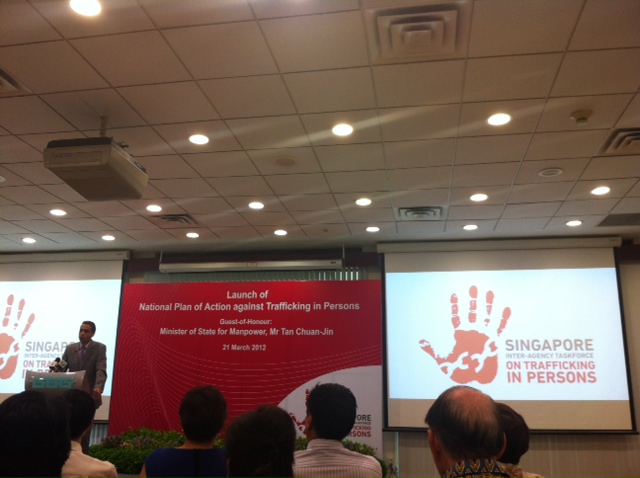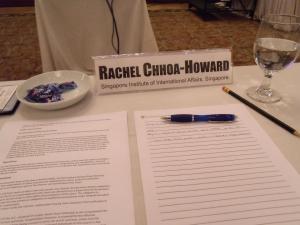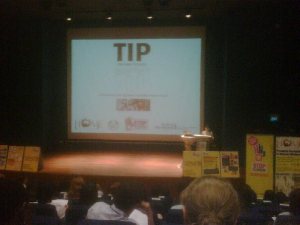
It has been some time since my last post, so I thought I would blog on some big news – for Singapore at least. The Singapore Government launched the National Plan of Action against Trafficking in Persons this morning, marking the end of a 2 year effort to put together the plan with stakeholders. It outlines Singapore’s strategy to combat human trafficking over the next four years using the 4P strategy: Prevention of TIP, Prosecution of Offenders, Protection of TIP victims and Partnerships with other countries, NGOs, academics and the private sector.
Singapore received a downgrade from tier 2 to the tier 2 watchlist in the 2010 US State Departments Trafficking in Persons report, putting it in the same company as countries like Afghanistan, Angola, Malaysia, Libya and even North Korea. Released annually, the report focuses mostly on the efforts the government is taking to address trafficking, rather than the actual scale each country is facing. In 2011, a few months after the government announced the formation of a Taskforce on Trafficking, Singapore was moved up to tier 2 again. If efforts continue, it is possible that the country will move up to the highest ranking of tier 1 in the next few years.
The National Action Plan will study the feasibility of accession to the UN Palermo Protocol on Trafficking in Persons (2000 United Nations TIP Protocol), which almost 150 countries have signed, and the setting up of a TIP hotline. It will review legislation related to TIP, enhance victim care services and conduct greater research on trafficking. The government has also included a indicative timeline which will allow the progress of the Plan to be monitored.
The National Plan of Action is a big step forward in the fight against human trafficking in Singapore – for one, the existance of the problem has been acknowledged. Despite this, much more remains to be done. According to the MHA, five sex trafficking and eight labour trafficking cases were prosecuted in 2010, with enforcement being taken against some 182 companies that showed signs of labour trafficking. However, Singapore laws do not explicitly address trafficking, although the Penal Code and Women’s Charter contain clauses that criminalise sex trafficking. Many organisations and NGOs are calling for a single law on trafficking that can be used to prosecute offenders. Apart from reviewing legislation, the taskforce should continue involving victims and other stakeholders in the Plan of Action, and work quickly to deliver on the initiatives it has outlined. One encouraging development from the draft plan, released for comments a few weeks ago, was the inclusion of a timeline, with time indicators on how long it would take to achieve action points.
More information on the significance of the launch of the Action Plan can be found here.
A day off for domestic workers
A few weeks ago, in another encouraging sign, Singapore announced that it was imposing a mandatory day off for domestic workers, which has been a long time coming.
Negative reactions from employers of domestic workers, have been abound on the internet. Most tellingly, they reveal the high level of dependence on foreign maids in the country, with one letter writer in a local newspaper writing, “Who will do the chores and look after the children and the elderly when the maids are enjoying their days off?”
The care giving and parental responsibilities of the employer seem to have been forgotten in such cases.
With such backlash, in this instance, the Singapore government has taken a brave step in instituting a mandatory law, especially since an estimated 60% of domestic workers in Singapore were not getting a day off. Progress comes from changes in laws. In many places, legal protections precede, not follow, the broader recognition of rights. Laws have a teaching effect. Laws that discriminate validate other kinds of discrimination. Laws that require equal protections reinforce the moral imperative of equality. Practically speaking, it is often the case that laws must change before fears about change dissipate. This is one such law that was well overdue. A good article on the moral imperative of a mandatory day off can be found here.
Human Rights and Trafficking
Finally, below is an article I wrote for ONE Singapore on the importance of human rights in combating trafficking. The link to the article on their website can be found here. It is worth noting that I wrote the article before the release of the National Action Plan, to avoid any confusion.
Fight Human Trafficking by Respecting Human Rights
With a National Plan of Action (NPA) on Trafficking in Persons due out in a few months, Singapore is at a turning point. A recent round of public consultations with NGOs, academia and interested persons suggests that the Trafficking in Persons Inter-agency Taskforce is committed to its mandate to tackle the issue of trafficking. Promisingly, the government is in principle adopting the UN definition on trafficking and adopting a 4P – Prevention, Prosecution, Protection and Partnership – approach to combat the issue. All this is very positive, but much work remains to be done in the final weeks and months before the NPA is released to ensure that its outcome is a good one.
There is still time to influence the Inter-agency Taskforce’s work, before it becomes national policy.
In particular, as anti-trafficking campaigners, we need to ensure that the National Plan of Action is grounded in a human rights perspective, which protects the rights of the victims. The Taskforce is conducting a final round of public consultations through 23 February and subsequently non-profit groups and members of the public can continue to advocate for these changes.
A victim-centred approach
Trafficking is a human rights issue because of the use of coercion and subsequent exploitation inherent in the practice. But a human rights perspective can also provide a better understanding of the problems experienced by those trafficked. Surely, to be a victim of trafficking is bad enough. But ‘victimisation’ – ignoring a victim’s needs and point of view, in the aftermath – can lead to deprivation of a victim’s self-control and autonomy, not to mention isolation from their family, society and the world around them.
A victim-centred approach focuses on empowering victims or survivors and restoring their dignity and self-worth. There are encouraging signs that Singapore is increasing its recognition of victims rights. In a marked change from the past, as long as a person claims to be trafficked in Singapore, it appears that the new National Plan of Action will ensure that she or he will be treated as a trafficking victim. Previously a foreigner who entered the country willingly to work illegally could have been treated as an immigration offender. It has also been agreed that a toll free 24 hour hotline will be set up, with translation services to allow trafficking victims to seek help. More details, such as who will run this hotline or when it will be established, are still unclear. As these questions are considered, it is imperative that the well-being of the victim comes first.
State responsibilities
In addition to victim protection, states also have a duty to prohibit trafficking and related acts, to prosecute and punish perpetrators and to address the causes and the consequences of trafficking itself.
When it comes to the prosecution of those responsible, the principle of non-refoulement or non-return means that temporary residence permits should be given to victims so that they can legally reside and work in Singapore, if they are at risk of re-entering the system. At all times, a victim should be able to remain in a state whilst court proceedings are underway, have effective witness protection of his/her identity and have free access to interpreters and legal advice. Compensation is an important form of remedy and the government bears the primary responsibility in this regard, because the fact that people are being trafficked illustrates the state’s failure to prevent traffickers from abusing victims. Apart from a government agency dedicated to trafficking, a body such as a national human rights institution should also be set up to monitor the issue.
Child Trafficking
When it comes to the particular issue of the commercial sexual exploitation of children, more measures must be taken. Reliable figures on child victims of trafficking for sexual purposes in Singapore remain difficult to obtain due to a lack of disaggregated data and the hidden and illegal nature of the crime. As such, the government should establish an independent monitoring mechanism to regularly supervise and gather information to ensure that child rights conform to the provisions set out in the Convention on the Rights of the Child, to which Singapore is a state party.
Singaporean law meanwhile provides for extraterritorial jurisdiction over Singaporean citizens and permanent residents who exploit children in other countries. However, the Singapore government has never prosecuted or convicted anyone for child sex tourism. The government must therefore re-examine this issue.
The role of poverty and discrimination
Finally, human rights can be used to address wider problems related to trafficking, including anti-poverty measures.
To the official 4Ps of fighting trafficking, I would add a 5th ‘P’: Poverty. Poverty is a human rights issue, as it affects economic, social and cultural rights – the right to food, housing and an adequate standard of health and education. Poverty is also a key driver of trafficking, compelling millions of migrant and foreign domestic workers to leave their home countries every year. When it comes to the sexual exploitation of children, poverty has an even bigger role to play as it often contributes to illiteracy, limited employment opportunities and difficult financial circumstances. Children and youth from financially-struggling families become easy targets for procurement agents, who lure girls and boys away with the promise of high-paying urban jobs only to force them into prostitution.
Another issue that fuels trafficking is discrimination. The lack of employment opportunities for people belonging to gender, racial or ethnic groups forces them to go elsewhere and is a reason why women, in particular, are more vulnerable to traffickers.
The way ahead
A human rights approach is not the only tool we can use to combat trafficking, but it is an important one.
As Singapore’s Inter-Agency Taskforce continues its work to develop a new National Plan of Action (NPA) on Trafficking in Persons, it must use a human rights perspective to analyse trafficking issues and develop appropriate responses. Addressing trafficking in Singapore will involve work by many parties – civil society organisations, government and individuals – at multiple levels. But by keeping an open mind, taking into account a variety of approaches and perspectives, we can ensure that we continue to move forward in the fight to reduce trafficking and closer to the goal of a safer, more equal society for all.
Some more links related to human trafficking in Singapore, and the National Plan of Action, are listed below
“Singapore Toughens its Stance on Human Trafficking” (Straits Times, 11 June 2011)
“How do we stop Human Trafficking” by ShuQi Liu (onesingapore.org, 22 Jan 2012)
Government unveils measures to tackle human trafficking (TODAY Online, 21 March 2012)




